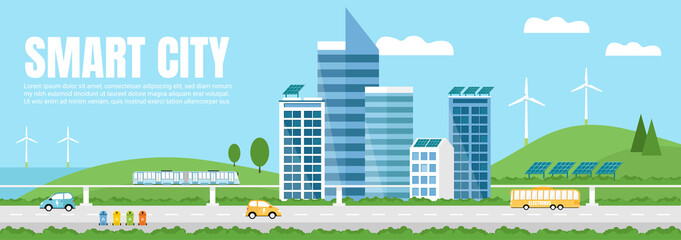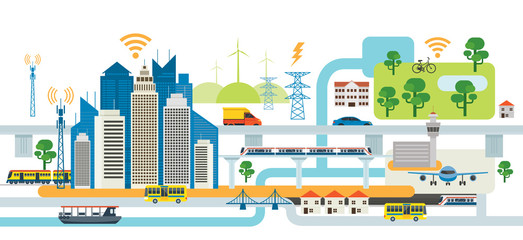In an era of rapid urbanization and technological advancement, the concept of smart cities has emerged as a transformative approach to urban development. By integrating cutting-edge technologies and innovative solutions, smart cities aim to enhance efficiency, sustainability, and quality of life for their residents. In this article, we’ll explore what smart cities are, their key components, benefits, challenges, case studies, and future trends.
1. Introduction to Smart Cities
Definition and Overview
Smart cities are urban areas that leverage digital technologies and data-driven solutions to address urban challenges and improve the quality of life for residents. These cities utilize interconnected infrastructure, advanced analytics, and innovative services to optimize resource usage, enhance public services, and foster economic growth.
Historical Background
The concept of smart cities has its roots in the early 21st century, as cities around the world began adopting technologies like sensors, data analytics, and connectivity to address urban issues such as traffic congestion, pollution, and resource management. Over the years, advancements in technology have accelerated the development of smart city initiatives, leading to a growing number of cities embracing this approach to urban planning.

2. Key Components of Smart Cities
Infrastructure and Connectivity
At the heart of smart cities are infrastructure and connectivity systems that enable seamless communication and data exchange between various components. This includes the deployment of IoT (Internet of Things) devices, sensors, and 5G networks to collect and transmit data in real-time.
Data Management and Analytics
Data plays a central role in smart city operations, driving insights and decision-making processes. Through big data analytics and AI (Artificial Intelligence) and machine learning algorithms, cities can analyze vast amounts of information to optimize services, predict future trends, and improve efficiency.
3. Benefits of Smart Cities
Improved Efficiency and Sustainability
One of the primary benefits of smart cities is the improved efficiency of urban systems and services. By optimizing energy usage, managing waste more effectively, and optimizing transportation networks, smart cities can reduce resource consumption and environmental impact, leading to greater sustainability.
Enhanced Quality of Life
Smart cities also aim to enhance the quality of life for residents by providing access to innovative services and amenities. From smart transportation systems that reduce commute times to healthcare and education initiatives that leverage technology to improve access and affordability, smart cities prioritize the well-being and satisfaction of their inhabitants.
Also check out : Virtual Reality (VR) and Augmented Reality (AR): Exploring the Future of Technology
4. Challenges and Considerations
Privacy and Security
Despite their many benefits, smart cities also pose privacy and security concerns related to the collection, storage, and use of personal data. Safeguarding data privacy and ensuring cybersecurity are critical considerations for smart city planners and policymakers.
Digital Divide
Another challenge facing smart cities is the digital divide, which refers to disparities in access to technology and digital services among different socioeconomic groups. Bridging this gap and ensuring equitable access to smart city initiatives is essential for promoting inclusivity and social cohesion.
5. Case Studies of Smart Cities
Singapore
Singapore is often cited as a leading example of a smart city, known for its integrated urban solutions and commitment to sustainability. The city-state has implemented various initiatives, including smart mobility systems, energy-efficient buildings, and digital government services.
Barcelona
Barcelona has gained recognition for its efforts to engage citizens in the smart city development process. Through initiatives such as open data platforms, participatory budgeting, and smart sensors in public spaces, Barcelona has empowered residents to actively contribute to the city’s sustainability and livability goals.

6. Future Trends in Smart City Development
Blockchain Technology
Blockchain technology holds promise for enhancing the security and transparency of smart city operations. By enabling secure transactions and smart contracts, blockchain can streamline administrative processes and reduce the risk of fraud and corruption.
Internet of Things (IoT) Expansion
The expansion of the Internet of Things (IoT) is expected to further accelerate smart city development. From smart homes equipped with connected appliances to smart grids that optimize energy distribution, IoT technology will continue to revolutionize urban living and resource management.
Conclusion
In conclusion, smart cities represent the future of urban living, offering innovative solutions to address the complex challenges of modern urbanization. By harnessing the power of technology and data, smart cities can create more sustainable, efficient, and inclusive urban environments that enhance the quality of life for residents. As cities around the world continue to embrace this approach to urban development, the possibilities for a smarter, more connected future are endless.

FAQs (Frequently Asked Questions)
- What are some examples of smart city initiatives? Examples of smart city initiatives include smart transportation systems, energy-efficient buildings, digital government services, and IoT-enabled infrastructure.
- How do smart cities benefit the environment? Smart cities benefit the environment by reducing resource consumption, minimizing pollution, and promoting sustainable practices such as renewable energy usage and waste reduction.
- What are the privacy concerns associated with smart cities? Privacy concerns in smart cities include issues related to data collection, surveillance, and the potential misuse of personal information by governments and corporations.
- How can individuals participate in smart city development? Individuals can participate in smart city development by engaging with local government initiatives, providing feedback on urban planning projects, and advocating for policies that promote sustainability and inclusivity.
- What role does citizen engagement play in smart city development? Citizen engagement is essential for the success of smart city initiatives, as it ensures that urban planning decisions reflect the needs and preferences of residents. By involving citizens in the decision-making process, cities can create more inclusive and responsive urban environments.





